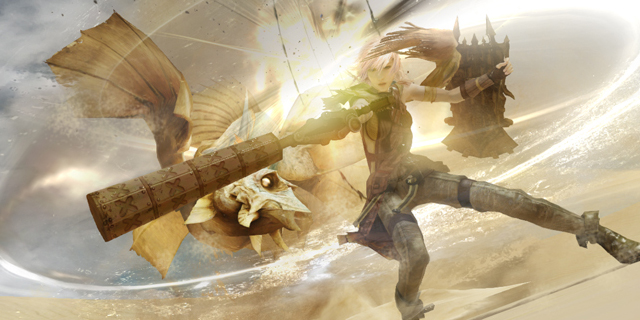
I’m an avid reader. When I was young, my father started reading to me before bedtime; Calvin & Hobbes was a mainstay, along with Swallows & Amazons, King Solomon’s Mines and other classic novels that would probably have been more appropriate for a seventh-grade English class than for an eight-year-old. I think that’s one of the main reasons I enjoy role-playing games so much: they contain far more text and story than other genres, and the speed at which I can scroll through it means I don’t have to endure long periods of inactivity.
However, some games cross the line. I’m all for reading, but lately I’ve been reminded that, sometimes, less is more.
For all the plot explanations and passionate monologues, story is usually done better by showing, not telling. Lightning Returns: Final Fantasy XIII and Super Paper Mario are clear examples of games that needed to trim the fat and cut down on the text.
Lightning Returns: Final Fantasy XIII is not a bad game. It’s certainly weird, there’s no denying that. Think Shenmue meets Assassin’s Creed meets Majora’s Mask meets Final Fantasy XIII. You play as Lightning, the main protagonist from Final Fantasy XIII. You’ve been chosen by God to become the world’s savior. Your goal is to save as many souls as possible, since the world in its current state will end after 13 days of in-game time. It sounds nothing like any other Final Fantasy you’ve played, and it plays nothing like any other Final Fantasy you’ve played. I like it.
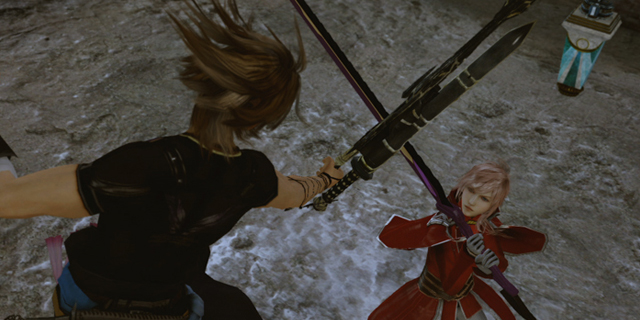
The open-ended nature of the game is appealing. Hearing about the Dead Dunes from a townsperson in Luxerion piques your curiosity to go and visit. Side quests often have you traversing across four distinct continents. The variation of the landscapes resulted in a world that I wanted to drown in. Exploration was greatly encouraged; hundreds of quests are available, and they’re the only means of improving Lightning’s stats. Square Enix did a marvelous job ensuring that all areas were worth the player’s time to investigate. Mainstays of the Final Fantasy series are all here: chocobos, moogles and familiar songs are a few of the numerous easter eggs that populate the game.
The problem, and it’s a big one, is that Lightning Returns is plagued with a script that is as long as the Bible and twice as convoluted. I’m all for a bit of explanation here and there, but there’s barely any emotion or plot development that’s shown; it’s all told. If Lightning doesn’t feel any emotion, she’ll spend five sentences telling you she doesn’t have any emotion. Hope has some insight about what God wants? Be prepared to hear (and read) the identical information multiple times throughout your play through.
To add to the problem, every time Hope wants to contact you, you’ll hear a notification. It’s like a friend you don’t want to hear from keeps texting you, even though you’ve already confirmed plans to meet at the restaurant at 7 o’clock. Beep-beep! Lightning, don’t forget we’re meeting at Chili’s at 7 o’clock! It’s a restaurant where people can go and eat food and consume beverages in exchange for money. I’ll remind you again in about ten minutes.
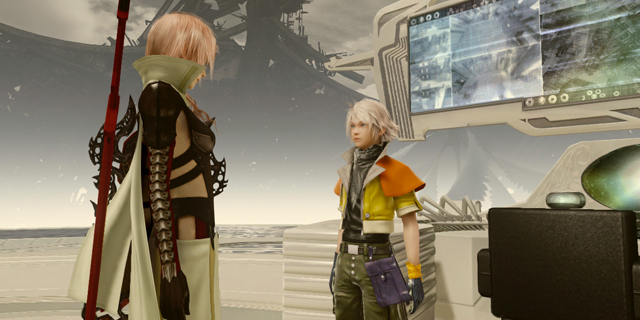
This is entirely unnecessary. As a tough, solo protagonist, Lightning doesn’t seek or want help from others, yet Hope acts as a nagging parent, setting curfews and providing the type of hand-holding that should be abolished by the fifth hour or so. Do I really need Hope to tell me that I’ve found seven of the ten items I need to finish a particular side quest? No, I really don’t.
It bogs the game down. I don’t mind reading a lot of text when it aids the story and adds to the game. Here, we have long-winded speeches about philosophical dogma, contradicting metaphors and a load of other story devices that aren’t fundamentally interesting.
The nostalgia and creative mechanics that I enjoyed so much were swept aside every time I had to read these repetitive exchanges. Instead of telling me how Lightning feels, show me. Somehow the character models and presentation have been downgraded since Final Fantasy XIII, so maybe Square Enix didn’t have the budget to create expressive facial animations, but surely it could have done something.
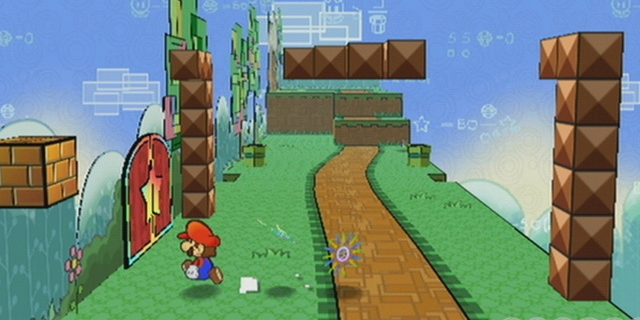
Super Paper Mario is another adventure that relies far too heavily on reading. The game has you guiding Mario, Princess Peach, Bowser and Luigi through a new world called Flipside, switching perspectives from 2D to 3D. There are light role-playing elements here, but they’re less prominent than in other Mario RPGs. There’s more of an emphasis on puzzles, and changing your view from 2D to 3D opens up creative possibilities and creates new, challenging obstacles for players to overcome.
It’s also the most text-heavy Mario game I’ve ever played. The previous games had a sprawling story, sure, but nothing like this. I found myself quickly bored with the endless plot points explained to me. Even Count Bleck and his hilarity couldn’t regain my interest. There are periods when text boxes pop up and seemingly never end, no matter how quickly you mash buttons.
It’s not a bad game, either. It’s extremely colorful and original, and it is a Mario game after all, so it’s reasonable to expect a relatively high level of gameplay. But the wall of words completely turned me off. I loathed constant cutscenes about the Void destroying the world if the Chaos Heart expands or the Pure Hearts don’t succeed. Something about a Dark Prognosticus, and weddings, and the villain wanting to recreate a new world in his own image. Super Mario RPG this isn’t.
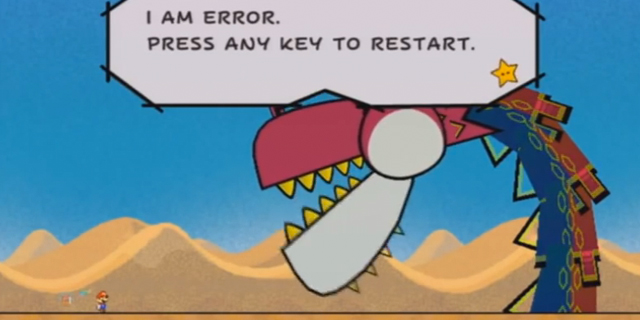
I get that games like Flower and Journey aren’t even in the same ballpark as the ones I’ve discussed, but part of their charm is the lack of instruction. There are no tutorials popping up in the way of a beautiful landscape, and no idle portions due to exposition; you’re free to explore the world and create your own story. I recently downloaded Ibb & Obb, a charming little PS3 platformer. You play as two little blobs who are completely dependent on each other to get through the gravity-defying levels. No text, no reading, no problem. The game wants to teach you about bouncy platforms? It shows a large, unplayable blob jumping up and down on it. If you’re on the other side of the platform, where you’ll almost definitely find yourself, you’ll bounce higher than your original jump. The game taught us a mechanic without forcing us to read.
I still love to read and I still love reading text in games. I wouldn’t play through lengthy RPGs if it didn’t have a compelling plot and character development, both of which need a combination of animation and text to convey. However, if I’m going to sit on my butt and read text in a medium that thrives on interactivity, I need it to be really good.



















